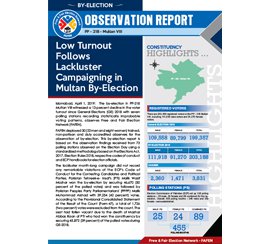ISLAMABAD, October 25, 2018: There is an immediate need to review the existing labour laws, unify them and make them consistent with Pakistan’s constitutional and international obligations and provide guarantees to workers particularly women. This was recommended in the first-ever Gender Audit of Pakistan’s Labour Laws, shared in a ceremony here, today.
The gender audit of more than 130 labour laws was conducted by Women’s Action for Better Workplaces (WAction) – a project of the Trust for Democratic Education and Accountability (TDEA), which identified major inconsistencies within the laws that were related to the maternity benefits, definitional contradictions, administrative weaknesses and social security. The findings recommended consolidation of these laws into four major streams—Terms of Services and Conditions, Industrial Relations, Social Security and Occupational Safety and Health.
The program was followed by a panel discussion with women legislators belonging to Pakistan Tehreek-e-Insaf (PTI), Pakistan Muslim League Nawaz (PML-N), Pakistan People’s Party Parliamentarians (PPPP), and Awami National Party (ANP). They included Dr. Nausheen Hamid, Mrs. Shandana Gulzar, Mrs. Mehnaz Akber Aziz, Mrs. Shamim Mumtaz, Mrs. Raheela Khadim Hussain and Mrs. Maliha Asghar Khan. Ms. Afiya Zia, Board Member of TDEA moderated the discussion.
The women legislators agreed that the laws need to be amended to ensure women representation, and urged for administrative changes to ensure effective implementation of the labour laws.
Despite signing the eight fundamental conventions of ILO, the conventions on C100 (Equal Remuneration) signed in 2001, and C 111 (Discrimination in Occupation) signed in 1961, remain the only conventions around which there is no provision in the federal legislation. Both these conventions are important to ensure that women are paid equal wages for equal work as men and are not discriminated against in any occupation.
The Gender Audit findings seek some immediate steps to ensure that the existing laws reflect the current economic realities. The laws are restricted by virtue of the definitions used therein which leave major contemporary institutions such as private schools, hospitals, medical centres, and parlours etc., outside the ambit of the labour laws. The findings suggest some recommendations to expand the scope of the law by modifying the definitions. The amendments will be channelled to the National Assembly to ensure that the laws are simplified for the betterment of the labour force.
To avoid mere repetition in the laws that causes confusion and incoherence, the findings recommend merging the Mines and Maternity Benefit Act 1941 with Maternity Benefits Ordinance 1958 by repealing the former and making the latter comprehensive to govern the subject of maternity.
The findings identify definitional issues in the law that needs to be replaced with a simple and all-encompassing descriptions to make the archaic labour laws speak to the modern day labours. It goes on to recommend that the gender neutral and gender blind language is evident in the law so much so that the words like ‘workmen’ and ‘he’ used for the workers are made more neutral, instead.
The Gender Audit findings further reveal that administrative weaknesses in the system, including lack of qualified staff, weak inspection mechanism, poor data collection techniques and dearth of equipment are a hurdle in the implementation of labour laws. The Labour Departments in the federal and the provincial capitals have poor gender ratios and have alarmingly low number of female staff. “Not having female labour inspectors means women issues do not get highlighted”, the findings suggest.
The findings further recommend to make it mandatory for the companies registered under the Companies Ordinance to submit a labour compliance report along with their annual report, which will be certified by the Labour Department.
There are alarmingly less women registered on the social security schemes such as the Employees Old Age Benefit (EOBI), the findings point out and recommend the relevant institutions to ensure women workers are registered by the companies on these schemes. It has also been recommended to enable the workers of all the establishments and factories—whether registered or not with the Labour Department—to get themselves registered with the Social Security Department and/or Workers’ Welfare Fund and EOBI whichever is relevant, on the provision of evidence as defined by the law to be eligible for admissible benefits.
Mr. Muhammad Ziauddin, Chairperson of TDEA acknowledged the need for updating the labour laws and ensuring women work force is protected for its effective participation in the country’s economy. He appreciated the efforts of the TDEA and WAction for bringing forth the audit findings which will greatly help amend labour laws in Pakistan. He also encouraged the stakeholders to ensure that the suggested recommendations are reflected in the policies and become part of the legislation.
WAction is funded by the Embassy of Netherlands, while the project is simultaneously been implemented in the federal as well as all four provincial capitals in the country- Islamabad, Lahore, Quetta, Peshawar, and Karachi, respectively.
To download Urdu Press Release, click here


